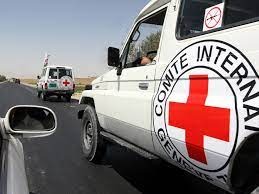A Red Cross bus arrives in a West Bank village delivering released Palestinian inmates
Early on Sunday, a bus transporting about thirty Palestinian inmates freed by Israel arrived in the West Bank. This came after Hamas released four foreigners and thirteen Israelis in the second round of exchanges arranged as part of a cease-fire agreement.
When the International Committee of the Red Cross bus pulled into Al Bireh, hundreds of people hailed it. As the bus came, crowds yelled “God is great,” and a number of young men stood on the bus’ top. Many people in the throng screamed pro-Hamas chants and waved Hamas flags.
According to the Israeli military, the four Thai captives who were freed by Hamas had been moved to Israel and will soon be reunited with their families.
In a video posted by Hamas, the captives are shown being taken by masked militants to Red Cross cars that are leaving Gaza, looking startled but generally in excellent physical shape.
When Nurhan Awad arrived in the Qalandia refugee camp, which is close to Jerusalem, immediately after her release, hundreds of people greeted her with heroism. In 2016, the 17-year-old was given a 13-and-a-half-year prison term for trying to attack an Israeli soldier with a pair of scissors.
Activated When Shurouq Duwiyat, a Palestinian lady, arrived at her Jerusalem home, her happy family gave her hugs and kisses.
Inside her house, Duwiyat told reporters, “We send a message to our people in Gaza that we stand by your side and support you.”
Israeli forces also cleared away journalists who had gathered outside Israa Jaabis’s residence in Jerusalem. Jaabis had been detained since 2015 after it was found that he had carried out many assaults against Israelis.
Six women and seven children were among the Israeli prisoners that Hamas freed on Saturday, according to a statement from Prime Minister Benjamin Netanyahu’s office. According to a kibbutz official, the majority of the freed prisoners were from Kibbutz Be’eri, which Hamas fighters decimated during their cross-border onslaught on October 7. The age range of the mothers was 18 to 67, while that of the children was three to sixteen.
For the people of Be’eri, it was a time of bittersweet memories. According to a kibbutz representative, every single one of the freed hostages had either lost a loved one in captivity in Gaza or had a family member murdered in the October 7 attack.
The statement said that 12-year-old Hila Rotem’s mother, who was one of the rescued captives, was still being held captive.
Another girl, Emily Hand, was kept captive for weeks by her father, who thought she had passed away.
Since the incident on October 7, kibbutz residents have been housed together at a hotel on the Dead Sea. Late on Saturday, a sizable group of people gathered in the hotel’s function area, roaring with elation as they watched the first pictures of their loved ones being shown.
Noga Weiss, 18, had a classmate who stated there was a lot of enthusiasm around her release.
“When I learned about the delay, I became really anxious. “I anticipated a reaction,” the student, who went by Zohar, according to Channel 13 TV. When I saw her, I felt a huge sense of relief.
The second day of the planned four-day truce was marked by a tense standoff as a result of the last-minute postponement. By dusk, when the prisoners were supposed to be freeing themselves from Gaza, Hamas said that the humanitarian supplies Israel had allowed had not lived up to expectations and had not reached northern Gaza, which serves as the major fighting zone and the center of Israel’s ground assault. Not enough veteran detainees were released in the initial exchange on Friday, according to Hamas.
In Beirut, top Hamas leader Osama Hamdan said, “This is putting the deal in danger.” However, following statements from Egypt, Qatar, and Hamas themselves claimed that challenges had been solved. Hamas also said that it anticipated the Israelis to release 33 juvenile males and six women.
On the first day of the truce, Israel released 39 Palestinian prisoners and Hamas released 24 of the approximately 240 captives it had abducted during its October 7 raid on Israel that had started the conflict.
During the four-day ceasefire, Hamas is expected to free at least 50 Israeli captives and 150 Palestinian inmates, all of whom are women and youngsters.
According to Israel, the ceasefire may be prolonged by one day for each ten prisoners who are liberated, something that US President Joe Biden expressed his hope will happen.
According to the White House, Biden discussed “hurdles” to the captive release on Saturday with Amir Sheikh Tamim Bin Hamad Al-Thani and Prime Minister Sheikh Mohammed bin Abdulrahman al Thani of Qatar.
A key plaza in Tel Aviv known as “the square of the hostages” was crowded with thousands of people waiting for word of the second release.
“Remember the others, as the going gets tougher and tougher.” It’s devastating,” Tel Aviv resident Neri Gershon said. Netanyahu’s administration has been charged by several families for not doing more to free the captives.
Wael Mesheh, 16, was part of the second exchange, and his family was working feverishly to prepare the house for his return in the West Bank’s Balata refugee camp. Over the phone, Hanadi Mesheh, his mother, said, “We are going to hug him so tight.”
An advocacy organization called the Palestinian Prisoners’ Club claims that Israel is detaining 7,200 Palestinians, of whom around 2,000 have been detained since the conflict began.







